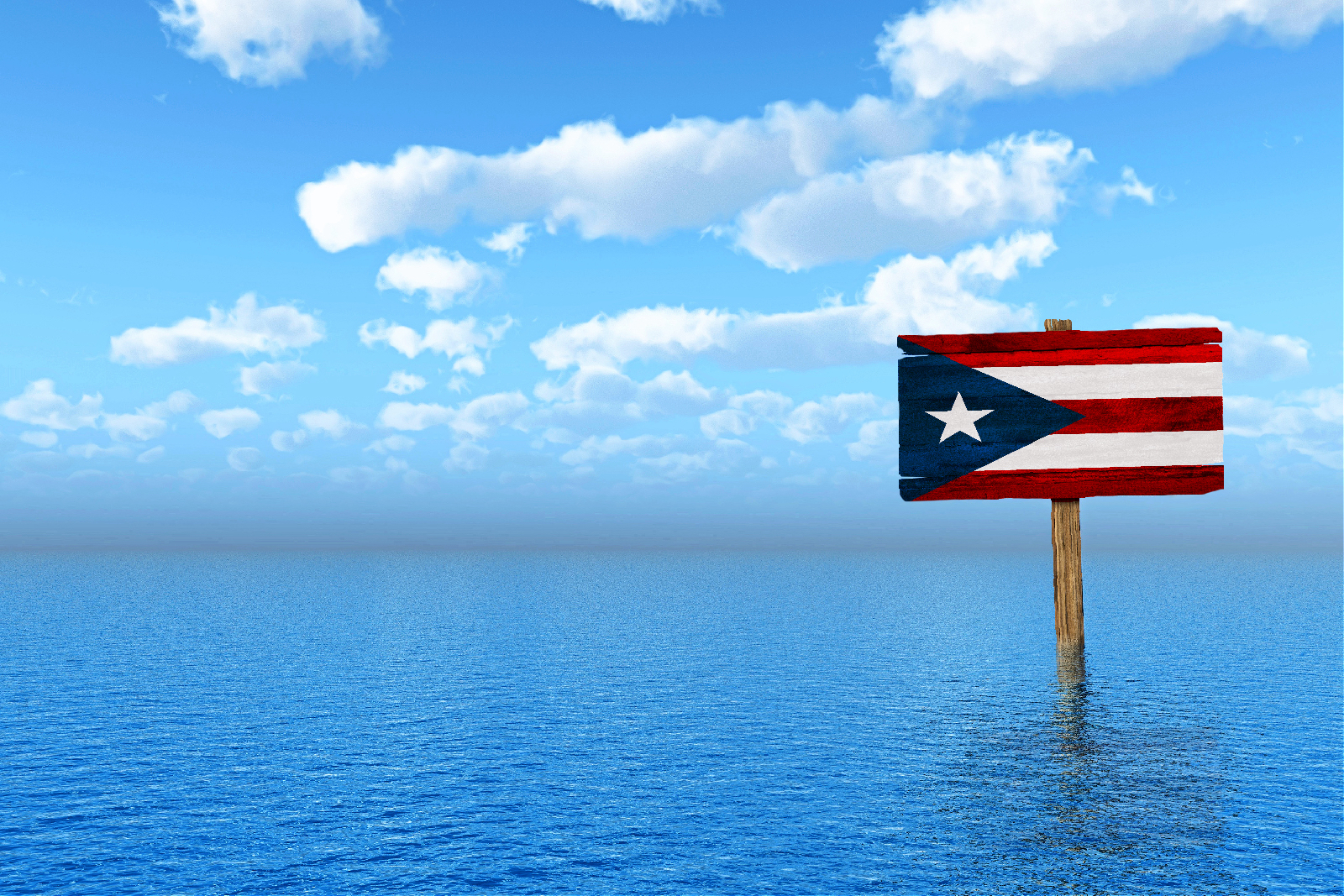
Why America’s Forgotten Paradise Won’t Survive Climate Change
Although the age of imperialism has long passed, Puerto Rico is still treated as a colony by the very country that “defends freedom” around the world. Discriminatory practices are still in play, territorial status continues to hinder economic development, and emerging geopolitical issues trap Puerto Ricans in the crossfire. Despite all these challenges, the U.S. appears to consistently distance itself from the island, prompting Puerto Rico to feel isolated on the global stage. This withdrawal is becoming progressively apparent with a new, irreversible issue—climate change. Given the historically distant relationship between the United States and Puerto Rico, it is increasingly probable that Puerto Ricans will be left to fend for themselves with the further intensification of climate change and natural disasters.
In the aftermath of Hurricane Maria in 2017, it became increasingly evident that natural disasters have a disproportionate impact on certain populations in our world. Researchers have long recognized that those who are most vulnerable and exposed to climate change are disproportionately affected by its disturbances and face several, irreversible impacts that damage their societies. As a relatively poor, underdeveloped island, Puerto Rico has hardly contributed to this global catastrophe but is unfortunately among one of the first areas to experience its effects. This was made worse by delayed U.S. federal government support, creating the effect that Puerto Rico was given second-class status and deemed insignificant compared to other mainland states.
Looking back at Hurricane Maria, we can see the immense destruction it had on the island, as thousands were killed, numerous buildings were leveled, and infrastructure deficiencies were widespread. Not only did many Puerto Ricans lose electricity for up to 11 months due to power grid failures, but clean water sources and transportation frameworks were damaged, making disaster recovery extremely difficult. Due to its lagging development and poor economy, Puerto Rico was unable to use their resources to recuperate and instead had to rely on the federal government’s lack of assistance.
The administration of former President Donald Trump demonstrated a pattern of behavior and rhetoric that suggested a dismissive attitude towards Puerto Rico, particularly soon after the full scope of the damage from Hurricane Maria became clear. There were social media posts from the former president referring to the island as not a part of the U.S., and at other times, he would complain about Puerto Ricans trying to take resources away from “American” farmers and states.
Perhaps one of the most telling episodes of this attitude was the widely publicized incident where Trump was seen tossing paper towels to Puerto Rican citizens in a manner that many interpreted as insensitive. This behavior was emblematic of a broader lack of urgency in responding to the crisis, contributing to significant delays in the disbursement of aid. As a result, nearly $20 billion in designated relief funds experienced critical holdups, arriving weeks behind schedule, and exacerbating the island’s plight.
The actions and comments from then-President Donald Trump towards Puerto Rico during its time of crisis were deeply distressing and perceived as offensive by many Puerto Ricans. It is a fundamental obligation of the federal government to assist in emergencies. The perceived trivialization of their dire circumstances by the government was in stark contrast to the reality faced by the residents of the island, who were in a desperate fight for survival. The rhetoric that seemingly cast Puerto Ricans as outsiders rather than citizens compounded a sense of abandonment and highlighted the ongoing challenges and disparities faced by the Hispanic community on the island.
This attitude towards Puerto Rico is also shared by many Americans as well. A poll taken after Hurricane Maria showed that almost half of all Americans did not know that Puerto Rico was a part of the U.S. A political paradox emerges here, as the island is politically and legally a part of the U.S., yet this representation is not universally comprehended. Puerto Ricans want to be further politically and economically integrated into the U.S. to capitalize on certain resources and be protected from looming issues, but this immense hostility and disrespect towards them by the “superior” mainland Americans challenge this reality. This inhibits Puerto Rico from reaching its true prosperity and developmental potential, as its association with the U.S. is constantly being questioned by many. As American citizens, they too ought to be treated with the same respect as their counterparts in the states, but it seems as if their ties have only continued to deteriorate over the years.
This trend continues to head in the wrong direction with the rates of climate illiteracy and climate denialism growing within the U.S. The conflicting viewpoints of those in top governmental positions to recognize the threat of climate change will exacerbate the effects faced by Puerto Ricans, as it provides little assurance and foreshadows a detrimental path ahead. This is of particular importance to the island in a humanitarian and economic manner, as they were among the top three most impacted areas in the world by climate change. With the escalation of global warming, Puerto Rico may be unable to withstand new natural disasters with the current federal response time, as essential infrastructure for communication, transportation, and food may become entirely eradicated before assistance arrives. This hints at a high possibility of Puerto Ricans becoming climate refugees, and with their worsening ties with the U.S., may have little options for future survivability.
The ethical quandaries posed by climate change extend beyond its material impacts, particularly when considering the political status of Puerto Rico. Despite Puerto Ricans holding American citizenship, their home’s designation as an unincorporated territory translates to fewer safeguards and less federal aid than states receive. This inequity raises profound moral questions about the distribution of emergency resources. When disasters strike simultaneously across states and territories, like a hypothetical hurricane affecting Georgia, Florida, and Puerto Rico, the federal response strategy becomes ethically complex.
Mainland American politicians primarily owe their allegiance to their constituents and home regions. Puerto Rico’s lack of voting representation in Congress means it often becomes an afterthought in legislative deliberations. In our scenario, representatives from Georgia and Florida would naturally prioritize their states, where their electoral support resides. Without voting delegates in Congress, Puerto Rico lacks advocates with the political power to ensure equitable support during crises. This systemic oversight underscores a significant ethical dilemma in the United States’ approach to disaster response and resource allocation.
The ethical debate surrounding Puerto Rico’s federal aid and resource allocation is multifaceted. A notable point of contention is that most Puerto Ricans do not pay federal income tax. This fact raises questions about the island’s entitlement to funds generated from U.S. taxpayers. The core of this ethical dilemma pits political policy against the moral imperative to uphold the sanctity of human life—a principle that stands in stark opposition to the notion of Puerto Rico being left to manage independently.
Complicating the issue further are arguments emphasizing a moral obligation to support communities most susceptible to climate change’s repercussions. Given the considerable contribution of the United States to global climate change through substantial greenhouse gas emissions, the responsibility to provide aid becomes even more pronounced. This ethical complexity requires a careful balance between fiscal policies and the humanitarian duty to assist those in the path of environmental calamities.
This coupling of moral obligations and reluctance to enact action is a very tricky situation that is detrimental to Puerto Rico. As the island faces the contemporary impacts of climate change alone, we can only hope that the negligent attitude of the United States won’t be the irreversible tipping point for Puerto Rico.

